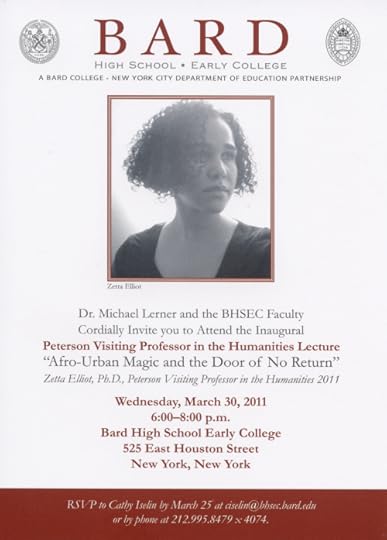Zetta Elliott's Blog, page 92
March 21, 2011
day's end
Today's the International Day for the Elimination of Racial Discrimination, which sounds sort of ridiculous since we all know that battle's been going on for CENTURIES. But it can't hurt to draw attention to this issue, and 2011 *is* the International Year for People of African descent. I like this essay posted on the FEDCan blog:
Very few people feel comfortable talking directly about discrimination, unless in very abstract terms. I expect that most Canadians would agree with the statement: "Racists are bad, and I'm definitely not racist." In fact, lots of people choose to wear Racism: Stop It! buttons on March 21, the International Day for the Elimination of Racial Discrimination. A large part of the problem is Canadians' self-understanding of our identity; we are nice people. So how could we allow bad things like racism to exist here?
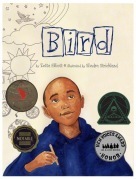 That's a huge hurdle to overcome—Canadians thinking they're too nice to be racist. I'm excited about my upcoming trip to Toronto in April, and look forward to introducing Canadian children to my books. Jill at Rhapsody in Books recently posted a really nice review of Bird; it's so gratifying to know my first book still resonates with readers.
That's a huge hurdle to overcome—Canadians thinking they're too nice to be racist. I'm excited about my upcoming trip to Toronto in April, and look forward to introducing Canadian children to my books. Jill at Rhapsody in Books recently posted a really nice review of Bird; it's so gratifying to know my first book still resonates with readers.
Lastly, you won't want to miss Doret's fabulous guest post at Kidlit Celebrates Women's History—she's got lots of great recommendations if you're looking for books about the important contributions made by women of color.








March 20, 2011
signs of spring
March 19, 2011
small world
 I often tell people that part of what makes me Canadian is knowing how to live a small life in a big place. I live in NYC but really, I live in Brooklyn. I was in the Village last night (after seeing Jane Eyre, which was spectacularly slow and irredeemably dull) and I could feel myself sliding into HSP overload—too many people, almost all of them young and loud and wearing lots of make-up. I felt like such an old lady and I kept marveling at the fact that I was out on a Friday night—in Manhattan! When I write, I shut down as much as I can; that enables me to focus on the world I'm building for my characters. Trouble is, once I finish writing I'm left with my own reduced reality. People stop calling when you stop answering the phone, and I'm *so* grateful that my friends stand by me whether I'm writing or not. They wait for me, and I appreciate that more than they'll ever know. I talked to my editor yesterday and he loves Ship of Souls, even calling it "better than Wish." I'm still tinkering with it, but feel good knowing that my next book has a home. Today I went to the park for a power walk and then ambled over to the boathouse. The
I often tell people that part of what makes me Canadian is knowing how to live a small life in a big place. I live in NYC but really, I live in Brooklyn. I was in the Village last night (after seeing Jane Eyre, which was spectacularly slow and irredeemably dull) and I could feel myself sliding into HSP overload—too many people, almost all of them young and loud and wearing lots of make-up. I felt like such an old lady and I kept marveling at the fact that I was out on a Friday night—in Manhattan! When I write, I shut down as much as I can; that enables me to focus on the world I'm building for my characters. Trouble is, once I finish writing I'm left with my own reduced reality. People stop calling when you stop answering the phone, and I'm *so* grateful that my friends stand by me whether I'm writing or not. They wait for me, and I appreciate that more than they'll ever know. I talked to my editor yesterday and he loves Ship of Souls, even calling it "better than Wish." I'm still tinkering with it, but feel good knowing that my next book has a home. Today I went to the park for a power walk and then ambled over to the boathouse. The  last time I was there, I found a pile of paving stones that wound up being a major part of the most dramatic scene in SOS. The time before that, I sat beside the water after a long walk and was joined by two swans—one of the most magical days ever. I get quiet when I'm in the park and that's why so many story ideas come to me then. Today the pile of paving stones was circled by a makeshift fence. I feel like I need to write these things down now so I don't forget about them later. I found two cowrie shells on the sidewalk near my home—that was what pushed me to write last winter, but SOS started a year ago just as spring was beginning. I was walking outside the park and looked through the fence and saw D, and Nyla, and Keem. They didn't have names then, but it was clear that the younger boy felt excluded by the older teens. And something invisible was stirring up the dead leaves on the ground. I can't really pin it down—isn't a story always in process, always growing in your mind?
last time I was there, I found a pile of paving stones that wound up being a major part of the most dramatic scene in SOS. The time before that, I sat beside the water after a long walk and was joined by two swans—one of the most magical days ever. I get quiet when I'm in the park and that's why so many story ideas come to me then. Today the pile of paving stones was circled by a makeshift fence. I feel like I need to write these things down now so I don't forget about them later. I found two cowrie shells on the sidewalk near my home—that was what pushed me to write last winter, but SOS started a year ago just as spring was beginning. I was walking outside the park and looked through the fence and saw D, and Nyla, and Keem. They didn't have names then, but it was clear that the younger boy felt excluded by the older teens. And something invisible was stirring up the dead leaves on the ground. I can't really pin it down—isn't a story always in process, always growing in your mind?  There's something about trees and rocks—they're solid, silent witnesses to so many things. I walked around the lake today and made myself look more closely at things I ordinarily ignore. Small as my world is, there's still a lot left undiscovered and unrecorded. Which is why I'm still tinkering with SOS, adding all the details that get lost when you focus on drama or conflict or the safety of your characters. I remember telling a friend about the book and she said, "Don't kill him at the end, Z—let him live." That wasn't my original intention, but she got her way and that means the book has a "to be continued" feel to it. For now, I'll settle for a manuscript that feels complete. I want the reader to see Brooklyn through D's eyes, which are really my eyes, of course…
There's something about trees and rocks—they're solid, silent witnesses to so many things. I walked around the lake today and made myself look more closely at things I ordinarily ignore. Small as my world is, there's still a lot left undiscovered and unrecorded. Which is why I'm still tinkering with SOS, adding all the details that get lost when you focus on drama or conflict or the safety of your characters. I remember telling a friend about the book and she said, "Don't kill him at the end, Z—let him live." That wasn't my original intention, but she got her way and that means the book has a "to be continued" feel to it. For now, I'll settle for a manuscript that feels complete. I want the reader to see Brooklyn through D's eyes, which are really my eyes, of course…








March 18, 2011
magnet
 I don't know about you, but when I start thinking about a certain subject, I often find that my mind turns into a sort of magnet—suddenly everything I'm reading, watching, or talking about leads me back to that particular topic. Right now, that topic is slavery; I'm teaching a new course on neo-slave narratives and realizing that the course design is in some ways insufficient. Not a good feeling to have when you're standing in front of a group of students who expect you to have all your ducks in a row. Yesterday I started talking about slavery in England and the British empire, and I kept throwing out titles—"Who's read Jane Eyre? How about Thackeray—Vanity Fair? What's that Jane Austen novel about slavery—Mansfield Park?" And all I got were blank stares. So then I asked, "How many of you are English majors?" Half the students raised their hands, but then I realized that these are American students; there's no reason they should be familiar with the British literary tradition. A couple of them had read Wide Sargasso Sea, but how do I teach a book set in the Caribbean when most of the students know nothing about slavery outside the US? That's when the magnet mind actually helps…on Monday I came home from class with a headache, turned on the TV fully expecting to fall asleep on the couch, and instead found myself riveted by an episode of Globe Trekker—the travel show—that was on…the trans-Atlantic slave trade! Great concept: most of the big tourist destinations on the globe are in some way tied to the slave trade. Think about that…
I don't know about you, but when I start thinking about a certain subject, I often find that my mind turns into a sort of magnet—suddenly everything I'm reading, watching, or talking about leads me back to that particular topic. Right now, that topic is slavery; I'm teaching a new course on neo-slave narratives and realizing that the course design is in some ways insufficient. Not a good feeling to have when you're standing in front of a group of students who expect you to have all your ducks in a row. Yesterday I started talking about slavery in England and the British empire, and I kept throwing out titles—"Who's read Jane Eyre? How about Thackeray—Vanity Fair? What's that Jane Austen novel about slavery—Mansfield Park?" And all I got were blank stares. So then I asked, "How many of you are English majors?" Half the students raised their hands, but then I realized that these are American students; there's no reason they should be familiar with the British literary tradition. A couple of them had read Wide Sargasso Sea, but how do I teach a book set in the Caribbean when most of the students know nothing about slavery outside the US? That's when the magnet mind actually helps…on Monday I came home from class with a headache, turned on the TV fully expecting to fall asleep on the couch, and instead found myself riveted by an episode of Globe Trekker—the travel show—that was on…the trans-Atlantic slave trade! Great concept: most of the big tourist destinations on the globe are in some way tied to the slave trade. Think about that…
[image error]
Next week we're reading The Book of Night Women by Marlon James; I hoped to find a video of James reading from the book but only found this podcast interview (#199) and this video interview on You Tube. But while I was on You Tube, I came across this fascinating BBC series, Slavery in Jamaica. It follows the fortunes of one British family, the Beckfords, who migrated to the Caribbean and built an astonishing fortune by exploiting slave labor on various sugar plantations. Unfortunately, only 4 excerpts are on You Tube and so I've emailed the BBC to find out about acquiring the entire program. Basically, I'm reconciled to the fact that this course will be much better the next time I teach it. The first time is always about trial and error, with students serving as guinea pigs, in a way. Sometimes I feel like I really want to teach a history course with novels rather than a literature course with historical content. I need some sort of hybrid! Today is all about grading and then going to see Jane Eyre…in between those two things, I'll be speaking with my editor about Ship of Souls.








March 17, 2011
Nyla
 It's hard switching gears…I've been revising Ship of Souls and feel like I'm still in their world rather than mine. This picture (above) helped me to develop Nyla's character. And this picture (below) will likely be the basis of my next book–an elevator in Brooklyn? No, it's a new public toilet…but still–the possibilities are endless…
It's hard switching gears…I've been revising Ship of Souls and feel like I'm still in their world rather than mine. This picture (above) helped me to develop Nyla's character. And this picture (below) will likely be the basis of my next book–an elevator in Brooklyn? No, it's a new public toilet…but still–the possibilities are endless…








March 15, 2011
Act of Grace
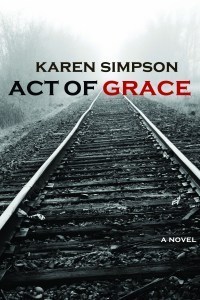 Good morning! Spring is on its way, and there are new books sprouting from the minds of creative, persistent people! Meet Karen Simpson and learn more about her debut novel, Act of Grace. Welcome, Karen!
Good morning! Spring is on its way, and there are new books sprouting from the minds of creative, persistent people! Meet Karen Simpson and learn more about her debut novel, Act of Grace. Welcome, Karen!
First I would like to say thank you Zetta for this opportunity to talk about my novel. I truly appreciate it.
In some ways, this is an exciting time to be an emerging author. Can you give us your take on the publishing industry and your path to publication?
It has been a long, interesting journey. I had considered myself a writer since I was twelve, but I didn't get serious until about ten years ago when I started Act of Grace. In some ways I'm glad I've arrived now because the past ten years weren't particularly great for writers of color seeking a foothold at traditional publishing houses. Now e-publishing and social media have, in some ways, leveled the playing field for all writers who want to get their work into readers' hands. Strong small presses are springing up and self-publishing has become a more viable option. I find it heartening that a very small press published this year's National Book Award Winner in Fiction. I'm happy I'm being published and championed by Plenary Publishing, a small multicultural press that has an exciting vision for the future of African American fiction.
Tell us about Act of Grace. Why did you choose to represent racial violence in the north?
Act of Grace is the story of Grace Johnson, a bright, perceptive African American high school senior who saves the life of a Klansman named Jonathan Gilmore. Everyone in her hometown of Vigilant, Michigan wants to know why. Few people, black or white, understand her act of sacrifice especially since rumor holds that years ago a member of the Gilmore family murdered several African-Americans, including Grace's father. Grace wants to remain silent on the matter but Ancestor spirits emerge in visions and insist she fulfill her shamanic duties by bearing witness to her town's violent racial history so that all involved might transcend it.
Grace begins a journal, but she warns readers upfront that if they are looking for a simple or rational explanation for her actions then they need to look elsewhere. She knows that her accounts of her ability to speak to the dead, along with her connections to a trickster spirit name Oba, will be hard for most people to believe. With insight shaped by the wisdom found in African American mythology and the book, The Velveteen Rabbit, Grace recounts a story of eye-for-an-eye vengeance that has blinded entire generations in her hometown.
Grace is loosely based on a violent incident that erupted during a Klan rally held in my hometown of Ann Arbor, Michigan some 15 years ago. Ann Arbor is a very liberal and diverse town and yet the Klan showed up and a near riot broke out. Northerners tend to want to believe that overt racism and intolerance are just southern problems. However, these problems were and still are deeply woven into the fabric of the rest of the nation. Lynchings, racial cleansing of towns, as well as overt and covert racism were also a part of northern life and history. The numbers of hate groups are increasing all over our nation, not just in the south. For example, my own home state of Michigan is ranked about fifth on the Southern Poverty Law Center list for numbers of hate groups. If we were to ask most people I don't think they wouldn't place Michigan that high because it's in the north, but the facts speak for themselves.
My students and I are currently considering the legacy of slavery and the potential for redemption through storytelling/testifying. What do you hope readers will take away from your novel?
Ah…there is great power in testifying. In my novel, Grace is told by the ancestors that she must write about why she saved Johnston Gilmore's life. She doesn't want to say anything about her experience but she is made to speak because the ancestors know that only by relating her story can she and others heal.
I write speculative fiction, in part, because it offers innovative avenues for looking at the world's problems. It is my hope that my novel Act of Grace leaves readers thinking about justice, community, tolerance, love, family, struggle, and healing in new and different ways. I also hope my novel will enable readers to have more honest and hope-filled conversations about these universal issues.








March 12, 2011
a bit of joy
Found on the side of the road, thriving amidst the trash and muck and dead leaves…I feel another novella coming on.








March 11, 2011
girlfight
When women don't get along folks line up to see the sparks fly, but what about when women collaborate and support one another? Two great interviews celebrate the strength of reciprocal relationships between women:
Ari at Reading in Color talks to Neesha Meminger:
When we create stories, part of what we do is create new possibilities and realities through the rules of the world we create. Women and girls have had functional, loving, caring, nurturing relationships for centuries. Women can work together in teams and partnerships where there is respect and compassion.
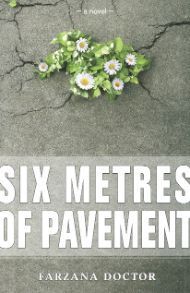 And at Women Doing Literary Things, Farzana Doctor writes about the lessons she learned from the "promo squad" that helped launch her new book:
And at Women Doing Literary Things, Farzana Doctor writes about the lessons she learned from the "promo squad" that helped launch her new book:
Being a member of my communities means that it's possible to create a Promo Squad and receive its generosity. It also means that I need to be generous in return, and I take this commitment seriously. I believe that we all have to open space for emerging writers, promote them, offer advice when asked. We should endeavour to be non-competitive, open-hearted with our colleagues. We need to use the privileges that we earn or stumble upon to pave the way for others. We also have to work on our internalized oppression so that we can see that our sisters' (and brown brothers', and trans siblings') work is just as relevant (and sometimes more relevant) than those who hold power in our society.








March 9, 2011
Women Doing Literary Things
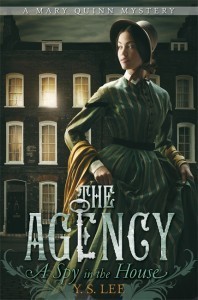 There's a new blog you should visit—today's contributor is Y.S. Lee!
There's a new blog you should visit—today's contributor is Y.S. Lee!
Women Doing Literary Things is a weekly blog series where women write about their involvement in the literary world. The series features essays by novelists, poets, editors, librarians, journalists, academics, booksellers and more, on the topic of being a woman in the literary arts. The first essay will be posted here tomorrow, March 8 2011–the 100th anniversary of International Women's Day.
If you've seen the VIDA statistics demonstrating the under-representation of women in most major publications, you know that women aren't getting a fair shake in a field that is nurtured and sustained by them. The WDLT series aims to celebrate and reaffirm the depth and breadth of women's involvement in literature, and to consequently highlight the fundamental wrongness of the gender disparities in the literary world. Perhaps the gatekeepers of publishing will hear what we have to say–and then do something about it.
I just finished my essay on the representations of blacks in Canadian children's literature. I was stunned when I found this interview with Marlene NourbeSe Philip in which she makes this disturbing admission:
When I finished Harriet's Daughter, for instance, and sent it out, I was told by one of the most prestigious publishing houses there that they liked the writing but they had a problem with the characters being black – which sent me into a tailspin for about a year and a half. If they tell me the writing is bad, I can fix that, but if they tell me they have a problem with the race of the characters it's like telling me they have a problem with my self.
What do we do when the gatekeepers blocking the way are women, too? WDLT promises lots of different perspectives on publishing, so stay tuned.








March 8, 2011
Women's History Month
Of course, we celebrate women's contributions all year round but the blogosphere's abuzz with special features you won't want to miss:
at Crazy Quilts , media specialist Edi is posting non-fiction titles about remarkable women of color
Doret at The Happy Nappy Bookseller joins the team of bloggers and authors at Kidlit Celebrates Women's History Month
Nathalie at Multiculturalism Rocks! has interviewed yours truly about my feminist role models and fascination with the past…
later this month I'll be giving a talk at Bard High School Early College ; I'm their Visiting Scholar and will give the inaugural Peterson Lecture in the Humanities—if you're in NYC, come out!






















